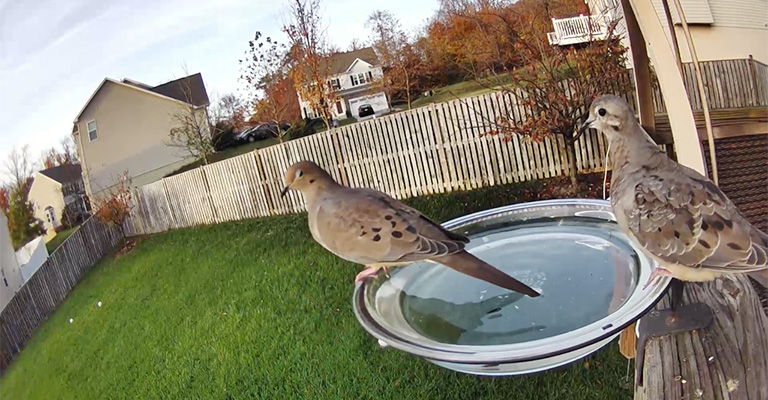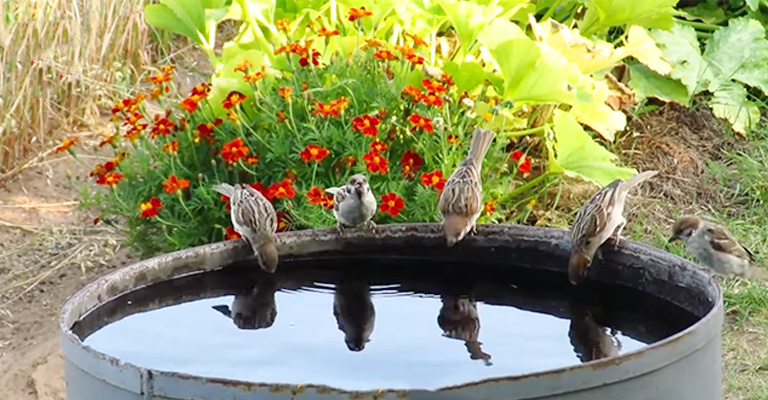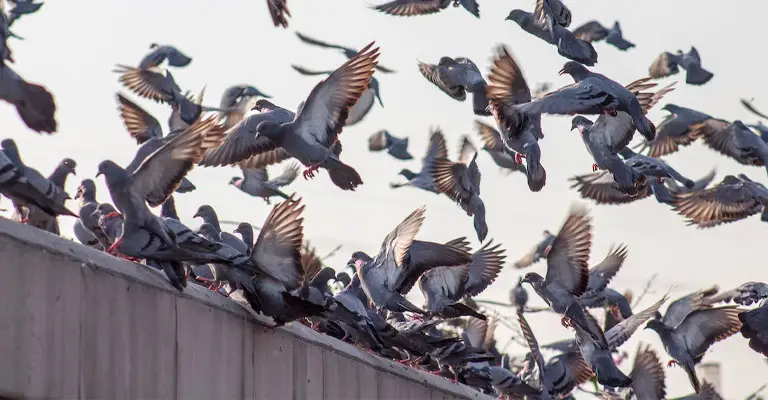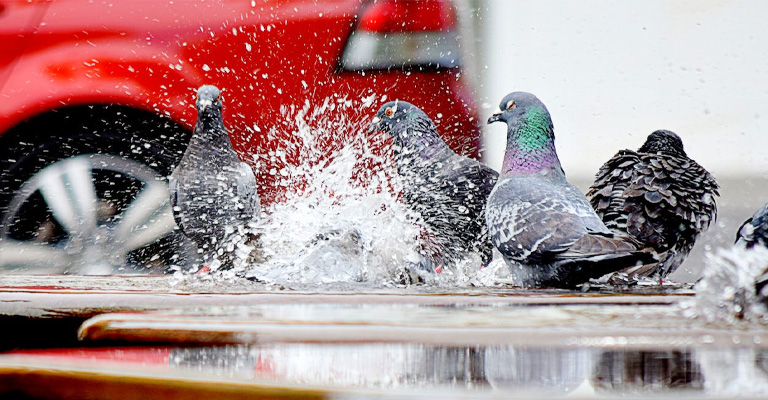Many bird owners may have experienced the frustrating problem of their birds pooping in their water bowls. This can be a frequent and unsanitary issue that can be difficult to solve.
As we got a lot of people asking about this issue, we decided to look forward to learning about the fact extensively. And here we are to write about it so that you can learn essential information.
So, the purpose of this blog is to explore the possible reasons why birds may engage in this behavior and to offer solutions for preventing it.
We will look at the possible instinctual reasons, the impact of poor hygiene, and the link between this behavior and a lack of stimulation in the bird’s environment.
By understanding the causes of this behavior, we can take steps to eliminate it and improve the overall well-being of our feathered friends.

Reasons for Birds Pooping in Their Water Bowls
Remember that identifying the reason for your bird’s problem can only help you find the solution. That’s why learning the reason is so important. Here Are Some Reasons for Birds Pooping in Their Water Bowls.
Instinctual Behavior
Birds pooping in their water bowls can be attributed to instinctual behavior inherited from their wild ancestors.
In the wild, birds may use water sources to conceal their scent and location from predators. By defecating in the water, they mask their scent and help their feces flow away from their nests.
Even in a domesticated setting, where predators are less of a concern, birds may still engage in this behavior as a remnant of their wild instincts. It is a deeply ingrained behavior that may persist despite the lack of practical necessity.
Lack of Proper Hygiene

Another reason for birds pooping in their water bowls could be a lack of proper hygiene. Birds instinctively maintain cleanliness, and their natural inclination is to separate waste from their living area.
However, if their living space is not adequately cleaned or their cage is overcrowded, they may resort to defecating in their water bowls as a means of avoiding dirty surroundings.
This behavior can be an indication that the bird’s environment needs attention and that their living conditions should be improved to promote better hygiene.
Boredom or Lack of Stimulation
Birds, especially intelligent and social species, require mental and physical stimulation to stay engaged and healthy.
In the absence of sufficient enrichment and activities, birds may resort to unusual behaviors, such as pooping in their water bowls, as a form of entertainment or self-stimulation.
It may provide them with a sense of novelty or a temporary diversion from their routine. Providing a stimulating environment with toys, perches, and regular interaction can help alleviate boredom and reduce such behavior.
It’s a Way of Marking Their Territory

Birds have a strong territorial instinct, and defecating in their water bowls can be a way for them to mark their territory.
By leaving their scent in a commonly used resource, such as a water bowl, they are communicating their presence and asserting ownership.
This behavior is more commonly observed in male birds during breeding season when they are more inclined to protect their territory and attract mates.
Ensuring an adequate number of water bowls or providing separate areas for feeding and drinking can help reduce territorial marking in bird cages.
It Can Be Used as a Weapon
In some cases, birds may exhibit territorial aggression by using their feces as a form of defense or intimidation.
They may intentionally poop in their water bowls and then splash or fling the water mixture at perceived threats or intruders, including other birds or humans. This behavior is more common in certain species, such as parrots.
It is important to understand the underlying causes of aggression and provide appropriate training and environmental modifications to manage such behavior and ensure the safety of both the bird and its human caretakers.
Solutions: Things to Do When Birds in Their Water Bowls

To prevent birds from pooping in their water bowls, several solutions can be implemented. Here are some effective strategies:
Separate water and food sources
Provide separate bowls or containers for food and water. By keeping them apart, birds are less likely to associate the water bowl with a feeding area, reducing the likelihood of soiling it.
Regular cleaning and maintenance
Maintain a clean and hygienic environment for your birds. Clean the water bowl daily, replacing the water with fresh, clean water. Birds are less likely to defecate in a clean water source, so regular cleaning can discourage this behavior.
Proper cage setup and space
Ensure that your bird’s cage is appropriately sized and well-designed. A spacious cage allows birds to move around and promotes a sense of territory.
Provide perches, toys, and other enrichments to keep them mentally stimulated and engaged, reducing the likelihood of boredom-related behaviors.
Offer alternative perching spots
Birds may poop in their water bowls when they lack alternative perching options. Provide multiple perches at different heights and locations within the cage.
This gives birds more choices for comfortable resting spots, decreasing the chances of them using the water bowl as a perch.
Environmental enrichment
Birds need mental stimulation to prevent boredom and unwanted behaviors. Offer a variety of toys, puzzles, and interactive objects that encourage exploration and play.
This can divert their attention away from the water bowl and discourage them from using it inappropriately.
Consistent training and positive reinforcement
Train your bird using positive reinforcement techniques to discourage unwanted behaviors. When your bird avoids pooping in the water bowl, reward them with treats or praise. Consistency and patience are key to shaping their behavior effectively.
Observe and address potential stressors
Birds may exhibit inappropriate behaviors, including pooping in their water bowls when they are stressed or anxious.
Identify and address any potential stressors in their environment, such as loud noises, sudden changes, or lack of social interaction. Creating a calm and secure environment can help minimize stress-related behaviors.
FAQs
It is possible that your bird may be sleeping during the day and is more active at night, leading to more opportunities to poop in the water bowl. It could also be that the bird is more relaxed and less stimulated at night, leading to more destructive behaviors. Providing additional stimulation and activities during the day and ensuring the water bowl is clean and changed before bedtime may help to prevent this behavior.
It’s possible that your bird may prefer to use a water bowl, even after being trained to use a water bottle. Offering both a water bowl and a water bottle can give the bird a choice, and may be more effective in preventing the bird from pooping in the water bowl. Additionally, make sure the water bowl is cleaned and changed regularly, and the bird’s environment is stimulating and provides plenty of activities.
Some birds may have a strong instinct to poop in their water bowls, regardless of the amount of stimulation provided in their environment.
Additionally, certain health conditions such as gastrointestinal issues could cause increased bowel movements and the bird may not be able to hold it. A consultation with an avian veterinarian may be helpful in identifying the underlying cause and providing appropriate treatment.
If you’ve tried all of the solutions discussed in this blog and your bird is still pooping in their water bowl, it may be helpful to consult with an avian veterinarian. They can examine your bird and rule out any underlying health issues that may be causing this behavior. Additionally, they may have other suggestions and solutions that can help to prevent this behavior.
End Call
We have discussed the common problem of birds pooping in their water bowls and explored the reasons why they may engage in this behavior.
Still, all the solutions may not work effectively for all birds. As you know, birds have variations in behavior according to species and other factors.
However, it is important to regularly clean and maintain water bowls or bottles to prevent unsanitary conditions and to ensure that the bird has access to clean water. This should be done on a regular basis and more frequently if the bird is known to poop in their water.
And also, your bird can mistakenly poop in his water. In this case, you don’t need to think much. Best of luck with your beautiful flying pet.